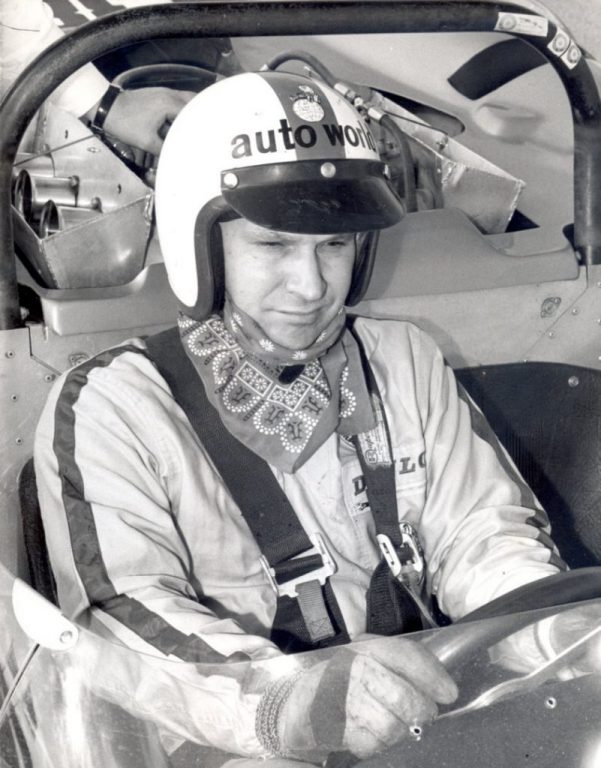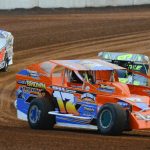Local legend and Hall of Famer Oscar Koveleski had a passion for auto racing. It showed during his driving career and was evident in the way he promoted and sold the sport.
Jack Deren, Koveleski’s longtime friend, crew chief and mechanic, has a caricature poster of the race car driver with the title “Every sport has its own Oscar… 33⅓% money, 33⅓% fun, 33⅓% crazy.”
Auto racing lost its Oscar when Koveleski, of Clarks Summit, died Monday at the age of 88.
“He was quite the guy and he will be missed,” said Deren, 86, of Carbondale. “He had a deep love for racing. He tried drag racing and oval racing, but he always said sports cars were what got his blood going.”
Born Nov. 29, 1932, in Moosic, Anthony Michael “Oscar” Koveleski was bitten by the racing bug at a young age. His first win came in a Sports Car Club of America Regional race at Bone Stadium in Pittston when he was 18 years old.
Throughout the 1950s and 1960s, he raced in SCCA Regional and National events. He competed in the first 24 Hours of Daytona in 1966, as well as in the 12 Hours of Sebring in March 1965. In August 1965, he teamed with Hal Keck of Hellertown to win the 500-mile race for production sports cars at Watkins Glen, New York, in a Shelby Cobra Ford. In 1970, he captured the SCCA National Championship Runoffs at Road Atlanta in A Sports Racing. From 1969 to 1972, he competed in the original Can-Am Series in his bright orange No. 54 car.
Also, he won the Giants Despair Hillclimb in Laurel Run six times (1966, 1969, 1975, 1976, 1977, 1979), setting the record of 44.127 seconds in 1977 in a Can-Am McLaren that stood for 15 years.
In 2015, he was inducted into the Sports Car Club of America Hall of Fame.
As much as he loved being a driver, however, he was a businessman and family man first.
“He was a very confident driver and he liked to win as much as anybody,” Deren said. “But he recognized his position on the grid and who he was racing with. So his goal was to finish. He couldn’t afford a crash or a blown engine. For him, a good finish was having fun and putting the car back in the trailer in one piece.”
Still, Koveleski received his fair share of attention without winning a ton of races.
“He couldn’t afford to test the way professional teams did,” Deren said. “But he said, ‘they’ll know I’m there’ and that’s when his promotional game kicked in.
“The McLaren team used to dominate, and this one time at Elkhart Lake they finished 1-2 again. But the article in the local newspaper just went on and on and on about Oscar. Because he would go and talk to the reporters. It wasn’t until the last paragraph of the article that commented Bruce and Denny (McLaren) had won again.”
Koveleski loved to talk. Deren said nobody really talked to Oscar. They listened to Oscar.
He recalls a charity event at the International Motor Racing Research Center at Watkins Glen, Koveleski was at the podium so long, talking and telling stories, champion driver Brian Redman started taking bids to get Koveleski to stop.
“By the time they were done, they raised $1,100,” Deren said.
Off the track, Koveleski founded Auto World in 1958. The model car and slot-racing car mail-order company originated on his kitchen table and grew to a facility on Keyser Avenue in Scranton. Countless youth had their love for cars and racing begin because of Auto World and its catalog.
One of them was John “J.J.” O’Malley. A Pittston native, O’Malley covered racing as a media member, authored 13 books on the sport, worked as public relations director at Watkins Glen and was communications manager for Grand-Am and IMSA. It was Koveleski who gave him his start.
“Growing up, Auto World was a great place to go,” said O’Malley, who lives in Port Orange, Florida. “That’s how I got to know Oscar. I did stories on him, saw him race the Giants Despair Hillclimb and covered the SCCA nationals at Pocono (Raceway). Even though IndyCar and NASCAR were the top two series, sports cars are the direction I went and he was the first to show me about them. I have a lot of great memories of him.
“Everyone knew him and had a lot of respect for him.”
When the model and slot-car craze began to fade, Koveleski began to promote radio-controlled cars, then developed the Kidracer, a motorized car that looked like an actual race car and gave kids a hands-on driving experience. O’Malley remembers being at the Long Beach Grand Prix one year and Koveleski renting out a local arena to hold Kidracer races.
From 1980 to 1996, Koveleski was involved in the SCCA Pocono Grand Prix at Pocono Raceway. In the week leading up to the double-national event, he would hold “Checkered Flag Days” in Scranton and Wilkes-Barre where the competing cars and drivers would be displayed on the street and sidewalks.
“Oscar played a vital role in hosting countless SCCA events at Pocono,” Pocono Raceway said in a statement. “Even more memorable were the motorized races he organized and held for kids. He left a lasting impression on youth racing in our surrounding area… We are forever grateful for all he contributed to motor sports and for being such a great friend of ours for so many years.”

ASSOCIATED PRESS FILE
Oscar Koveleski of Clarks Summit sits behind the wheel at the American Road Race of Champions at Daytona International Speedway on Nov. 26, 1967.
Koveleski did public relations for Newman-Sharp Racing, which included among its drivers Scott Sharp, actors Paul Newman and Tom Cruise and Pro Football Hall of Famer Walter Payton.
He also served on the board of directors of the Motor Racing Safety Society.
Kip Zeiter, visitor services/outreach coordinator for the IMRRC, said Koveleski would often call to pitch an idea.
“Each time he called the Research Center, I knew the call would last at least 20 minutes as he would talk about his latest project/idea,” Zeiter said. “Not all of them were good, but they were always interesting. You had to pay attention because he would quickly move from one thing to another. He was always thinking ahead.”
Most of all, racing was fun for him and he was a bit of a prankster.
J.C. Argetsinger is president of IMRRC and son of the late Cameron Argetsinger, founder of the Watkins Glen track. He recalls a trick Koveleski played on Can-Am Series sponsor Johnson Wax where Koveleski and his crew emptied several cans of the wax and replaced it with butterscotch pudding. When the corporate sponsor stopped by the pits, Koveleski’s crew was eating the “wax” and declaring how good it tasted.
“He was soon designated as the clown prince of racing,” Argetsinger said.
Along with fellow racers Tony Adamowicz and Brad Niemcek, Koveleski in 1970 created the Polish Racing Drivers of America. There were four criteria to become a member: be a racing driver and be Polish; be a racing driver and not be Polish; not be a racing driver and be Polish; not be a racing driver and not be Polish.
In other words, anyone could join.
That’s what Koveleski wanted; for everyone to share in his passion for racing.
He is survived by his wife Elaine and children Robert, Sharon, Lee Ann and Chris.

During more than 30 years at The Times-Tribune, Scott has covered everything from high schools to the Wilkes-Barre/Scranton Penguins. His current beats include motor sports, local colleges, high school cross country and high school baseball. He also is a copy editor and page designer. His articles have won awards from the Associated Press Sports Editors, American Auto Racing Writers and Broadcasters Association, Eastern Motorsports Press Association, the Society of Professional Journalists Keystone Pro Chapter and the Pennsylvania NewsMedia Association Keystone Press. He also has been honored by the Atlantic Collegiate Baseball League and the Minor League Football Alliance. In 2016, he was presented the Media Service Award by the Northeastern Pennsylvania Sports Hall of Fame. A Long Island, New York, native, Scott graduated from the University of Scranton in 1986 with a bachelor’s degree in communications. He lives in Peckville with his wife, Andrea, and daughters, Bridget and Emily. Contact him at swalsh@timesshamrock.com; 570-348-9100, x5109; or @swalshTT on Twitter




